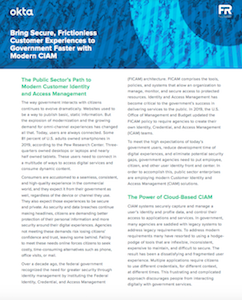- Sponsored
- Modernization
The public sector’s path to modern customer identity and access management

The COVID-19 pandemic has created both motivation and opportunity for federal agencies to interact with citizens in new ways. The growing demand for digital experiences means that identity and access management has become critical to the government’s success in delivering services.
To meet the high expectations of today’s users, reduce development time of digital experiences and eliminate potential security gaps, government agencies need to put user identities front and center.

Read the full report.
In order to accomplish this, public sector enterprises are employing modern customer identity and access management (CIAM) solutions, according to a recent Okta report.
The report describes the ability of CIAM tools to “securely capture and manage a user’s identity and profile data and control their access to applications and services.” This allows agencies to centralize access management across multiple applications and offer a frictionless user experiences that is more secure and highly scalable.
The report outlines examples of how divisions under the U.S. Air Force, State Department and Centers for Medicare and Medicaid all have implemented modern identity and access solutions to streamline user experience and reduce overall IT operations costs.
In each use case, the Okta platform helped the organization simplify and secure access to systems and set up APIs to streamline access to databases. Additionally, agencies benefited from a broader view of user activity across applications to understand exactly who saw what information.
“Citizen and government users expect the same frictionless experiences across all their devices that they receive as consumers,” says the report, and FedRAMP-approved CIAM solutions help agencies achieve that by creating a secure, scalable repository designed specifically to store and manage user information.
Learn more about the poser of cloud-based customer identity and access management (CIAM) solutions.
This article was produced by FedScoop for, and sponsored by, Okta.






